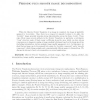Free Online Productivity Tools
i2Speak
i2Symbol
i2OCR
iTex2Img
iWeb2Print
iWeb2Shot
i2Type
iPdf2Split
iPdf2Merge
i2Bopomofo
i2Arabic
i2Style
i2Image
i2PDF
iLatex2Rtf
Sci2ools
159
Voted
JMIV
2011
2011
Periodic Plus Smooth Image Decomposition
When the Discrete Fourier Transform of an image is computed, the image is implicitly assumed to be periodic. Since there is no reason for opposite borders to be alike, the “periodic” image generally presents strong discontinuities across the frame border. These edge effects cause several artifacts in the Fourier Transform, in particular a well-known “cross” structure made of high energy coefficients along the axes, which can have strong consequences on image processing or image analysis techniques based on the image spectrum (including interpolation, texture analysis, image quality assessment, etc.). In this paper, we show that an image can be decomposed into a sum of a “periodic component” and a “smooth component”, which brings a simple and computationally efficient answer to this problem. We discuss the interest of such a decomposition on several applications.
| Added | 14 May 2011 |
| Updated | 14 May 2011 |
| Type | Journal |
| Year | 2011 |
| Where | JMIV |
| Authors | Lionel Moisan |
Comments (0)

